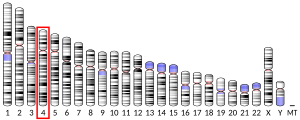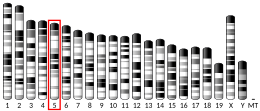WFS1
Volframin jest protein koji je kod ljudi kodiran genom WFS1 sa hromosoma 4.[5][6][7]
Aminokiselinska sekvenca
[uredi | uredi izvor]Dužina polipeptidnog lanca je 890 aminokiselina, а molekulska težina 100.292 Da.[8]
| 10 | 20 | 30 | 40 | 50 | ||||
|---|---|---|---|---|---|---|---|---|
| MDSNTAPLGP | SCPQPPPAPQ | PQARSRLNAT | ASLEQERSER | PRAPGPQAGP | ||||
| GPGVRDAAAP | AEPQAQHTRS | RERADGTGPT | KGDMEIPFEE | VLERAKAGDP | ||||
| KAQTEVGKHY | LQLAGDTDEE | LNSCTAVDWL | VLAAKQGRRE | AVKLLRRCLA | ||||
| DRRGITSENE | REVRQLSSET | DLERAVRKAA | LVMYWKLNPK | KKKQVAVAEL | ||||
| LENVGQVNEH | DGGAQPGPVP | KSLQKQRRML | ERLVSSESKN | YIALDDFVEI | ||||
| TKKYAKGVIP | SSLFLQDDED | DDELAGKSPE | DLPLRLKVVK | YPLHAIMEIK | ||||
| EYLIDMASRA | GMHWLSTIIP | THHINALIFF | FIVSNLTIDF | FAFFIPLVIF | ||||
| YLSFISMVIC | TLKVFQDSKA | WENFRTLTDL | LLRFEPNLDV | EQAEVNFGWN | ||||
| HLEPYAHFLL | SVFFVIFSFP | IASKDCIPCS | ELAVITGFFT | VTSYLSLSTH | ||||
| AEPYTRRALA | TEVTAGLLSL | LPSMPLNWPY | LKVLGQTFIT | VPVGHLVVLN | ||||
| VSVPCLLYVY | LLYLFFRMAQ | LRNFKGTYCY | LVPYLVCFMW | CELSVVILLE | ||||
| STGLGLLRAS | IGYFLFLFAL | PILVAGLALV | GVLQFARWFT | SLELTKIAVT | ||||
| VAVCSVPLLL | RWWTKASFSV | VGMVKSLTRS | SMVKLILVWL | TAIVLFCWFY | ||||
| VYRSEGMKVY | NSTLTWQQYG | ALCGPRAWKE | TNMARTQILC | SHLEGHRVTW | ||||
| TGRFKYVRVT | DIDNSAESAI | NMLPFFIGDW | MRCLYGEAYP | ACSPGNTSTA | ||||
| EEELCRLKLL | AKHPCHIKKF | DRYKFEITVG | MPFSSGADGS | RSREEDDVTK | ||||
| DIVLRASSEF | KSVLLSLRQG | SLIEFSTILE | GRLGSKWPVF | ELKAISCLNC | ||||
| MAQLSPTRRH | VKIEHDWRST | VHGAVKFAFD | FFFFPFLSAA |
Funkcija
[uredi | uredi izvor]Ovaj gen kodira transmembranski protein, koji se primarno nalazi u endoplazmatskom retikulumu i sveprisutno eksprimiran sa najvišim nivoima u mozgu, pankreasu, srcu i insulinskim linijama beta-ćelija.[7] Čini se da Wolframin funkcionira kao kationski selektivni ionski kanal.[9]
Klinički značaj
[uredi | uredi izvor]Mutacije u ovom genu povezane su sa Wolframovim sindromom, koji se također naziva DIDMOAD (Diabetes Insipidus, Diabetes Mellitus, optička atrofija i deafness = gluhoća), autosomno recesivnim poremećajem. Bolest karakterizira neimunski insulinski zavisni dijabetes melitus i bilateralna progresivna optička atrofija, koja se obično javlja u djetinjstvu ili ranoj odrasloj dobi. Različiti neurološki simptomi, uključujući predispoziciju za psihijatrijsku bolest, također mogu biti povezani s ovim poremećajem. Veliki broj i raznovrsnost mutacija u ovom genu, posebno u egzonu 8, može biti povezana sa ovim sindromom. Mutacije u ovom genu također mogu uzrokovati autosomno dominantnu gluhoću 6 (DFNA6), također poznatu kao DFNA14 ili DFNA38.[7]
Mutacije ovog gena su takođe povezane sa kongenitalnim kataraktom.[10]
Reference
[uredi | uredi izvor]- ^ a b c GRCh38: Ensembl release 89: ENSG00000109501 - Ensembl, maj 2017
- ^ a b c GRCm38: Ensembl release 89: ENSMUSG00000039474 - Ensembl, maj 2017
- ^ "Human PubMed Reference:". National Center for Biotechnology Information, U.S. National Library of Medicine.
- ^ "Mouse PubMed Reference:". National Center for Biotechnology Information, U.S. National Library of Medicine.
- ^ Polymeropoulos MH, Swift RG, Swift M (Jan 1995). "Linkage of the gene for Wolfram syndrome to markers on the short arm of chromosome 4". Nat Genet. 8 (1): 95–7. doi:10.1038/ng0994-95. PMID 7987399. S2CID 13210147.
- ^ Inoue H, Tanizawa Y, Wasson J, Behn P, Kalidas K, Bernal-Mizrachi E, Mueckler M, Marshall H, Donis-Keller H, Crock P, Rogers D, Mikuni M, Kumashiro H, Higashi K, Sobue G, Oka Y, Permutt MA (Oct 1998). "A gene encoding a transmembrane protein is mutated in patients with diabetes mellitus and optic atrophy (Wolfram syndrome)". Nat Genet. 20 (2): 143–8. doi:10.1038/2441. PMID 9771706. S2CID 11917210.
- ^ a b c "WFS1 wolframin ER transmembrane glycoprotein [ Homo sapiens (human) ]". National Center for Biotechnology Information.
- ^ "UniProt, O76024" (jezik: engleski). Pristupljeno 26. 10. 2021.
- ^ Osman AA, Saito M, Makepeace C, Permutt MA, Schlesinger P, Mueckler M (decembar 2003). "Wolframin expression induces novel ion channel activity in endoplasmic reticulum membranes and increases intracellular calcium". J. Biol. Chem. 278 (52): 52755–62. doi:10.1074/jbc.M310331200. PMID 14527944.
- ^ Berry V, Gregory-Evans C, Emmett W, Waseem N, Raby J, Prescott D, Moore AT, Bhattacharya SS (mart 2013). "Wolfram gene (WFS1) mutation causes autosomal dominant congenital nuclear cataract in humans". Eur. J. Hum. Genet. 21 (12): 1356–60. doi:10.1038/ejhg.2013.52. PMC 3831071. PMID 23531866.
Dopunska literatura
[uredi | uredi izvor]- Khanim F, Kirk J, Latif F, Barrett TG (2001). "WFS1/wolframin mutations, Wolfram syndrome, and associated diseases". Hum. Mutat. 17 (5): 357–67. doi:10.1002/humu.1110. PMID 11317350. S2CID 2944382.
- Cryns K, Sivakumaran TA, Van den Ouweland JM, et al. (2004). "Mutational spectrum of the WFS1 gene in Wolfram syndrome, nonsyndromic hearing impairment, diabetes mellitus, and psychiatric disease". Hum. Mutat. 22 (4): 275–87. doi:10.1002/humu.10258. PMID 12955714. S2CID 39815754.
- McHugh RK, Friedman RA (2006). "Genetics of hearing loss: Allelism and modifier genes produce a phenotypic continuum". The Anatomical Record Part A: Discoveries in Molecular, Cellular, and Evolutionary Biology. 288 (4): 370–81. doi:10.1002/ar.a.20297. PMID 16550584.
- Lesperance MM, Hall JW, Bess FH, et al. (1996). "A gene for autosomal dominant nonsyndromic hereditary hearing impairment maps to 4p16.3". Hum. Mol. Genet. 4 (10): 1967–72. doi:10.1093/hmg/4.10.1967. PMID 8595423.
- Strom TM, Hörtnagel K, Hofmann S, et al. (1999). "Diabetes insipidus, diabetes mellitus, optic atrophy and deafness (DIDMOAD) caused by mutations in a novel gene (wolframin) coding for a predicted transmembrane protein". Hum. Mol. Genet. 7 (13): 2021–8. doi:10.1093/hmg/7.13.2021. PMID 9817917.
- Van Camp G, Kunst H, Flothmann K, et al. (1999). "A gene for autosomal dominant hearing impairment (DFNA14) maps to a region on chromosome 4p16.3 that does not overlap the DFNA6 locus". J. Med. Genet. 36 (7): 532–6. doi:10.1136/jmg.36.7.532 (neaktivno 31. 5. 2021). PMC 1734405. PMID 10424813.CS1 održavanje: DOI nije aktivan od 2021 (link)
- Hardy C, Khanim F, Torres R, et al. (1999). "Clinical and molecular genetic analysis of 19 Wolfram syndrome kindreds demonstrating a wide spectrum of mutations in WFS1". Am. J. Hum. Genet. 65 (5): 1279–90. doi:10.1086/302609. PMC 1288280. PMID 10521293.
- Furlong RA, Ho LW, Rubinsztein JS, et al. (2000). "A rare coding variant within the wolframin gene in bipolar and unipolar affective disorder cases". Neurosci. Lett. 277 (2): 123–6. doi:10.1016/S0304-3940(99)00865-4. PMID 10624825. S2CID 31662957.
- Awata T, Inoue K, Kurihara S, et al. (2000). "Missense variations of the gene responsible for Wolfram syndrome (WFS1/wolframin) in Japanese: possible contribution of the Arg456His mutation to type 1 diabetes as a nonautoimmune genetic basis". Biochem. Biophys. Res. Commun. 268 (2): 612–6. doi:10.1006/bbrc.2000.2169. PMID 10679252.
- Ohtsuki T, Ishiguro H, Yoshikawa T, Arinami T (2000). "WFS1 gene mutation search in depressive patients: detection of five missense polymorphisms but no association with depression or bipolar affective disorder". Journal of Affective Disorders. 58 (1): 11–7. doi:10.1016/S0165-0327(99)00099-3. PMID 10760554.
- Gómez-Zaera M, Strom TM, Rodríguez B, et al. (2001). "Presence of a major WFS1 mutation in Spanish Wolfram syndrome pedigrees". Mol. Genet. Metab. 72 (1): 72–81. doi:10.1006/mgme.2000.3107. PMID 11161832.
- Kaytor EN, Zhu JL, Pao CI, Phillips LS (2001). "Physiological concentrations of insulin promote binding of nuclear proteins to the insulin-like growth factor I gene". Endocrinology. 142 (3): 1041–9. doi:10.1210/en.142.3.1041. PMID 11181517.
- Takeda K, Inoue H, Tanizawa Y, et al. (2001). "WFS1 (Wolfram syndrome 1) gene product: predominant subcellular localization to endoplasmic reticulum in cultured cells and neuronal expression in rat brain". Hum. Mol. Genet. 10 (5): 477–84. doi:10.1093/hmg/10.5.477. PMID 11181571.
- Tessa A, Carbone I, Matteoli MC, et al. (2001). "Identification of novel WFS1 mutations in Italian children with Wolfram syndrome". Hum. Mutat. 17 (4): 348–9. doi:10.1002/humu.32. PMID 11295831. S2CID 45109749.
- Bespalova IN, Van Camp G, Bom SJ, et al. (2002). "Mutations in the Wolfram syndrome 1 gene (WFS1) are a common cause of low frequency sensorineural hearing loss". Hum. Mol. Genet. 10 (22): 2501–8. doi:10.1093/hmg/10.22.2501. PMC 6198816. PMID 11709537.
- Young TL, Ives E, Lynch E, et al. (2002). "Non-syndromic progressive hearing loss DFNA38 is caused by heterozygous missense mutation in the Wolfram syndrome gene WFS1". Hum. Mol. Genet. 10 (22): 2509–14. doi:10.1093/hmg/10.22.2509. PMID 11709538.
- Crawford J, Zielinski MA, Fisher LJ, et al. (2002). "Is there a relationship between Wolfram syndrome carrier status and suicide?". Am. J. Med. Genet. 114 (3): 343–6. doi:10.1002/ajmg.10256. PMID 11920861.
Vanjski linkovi
[uredi | uredi izvor]Ovaj članak uključuje tekst iz Nacionalne medicinske biblioteke Sjedinjenih Država, koji je u javnom vlasništvu.
}




